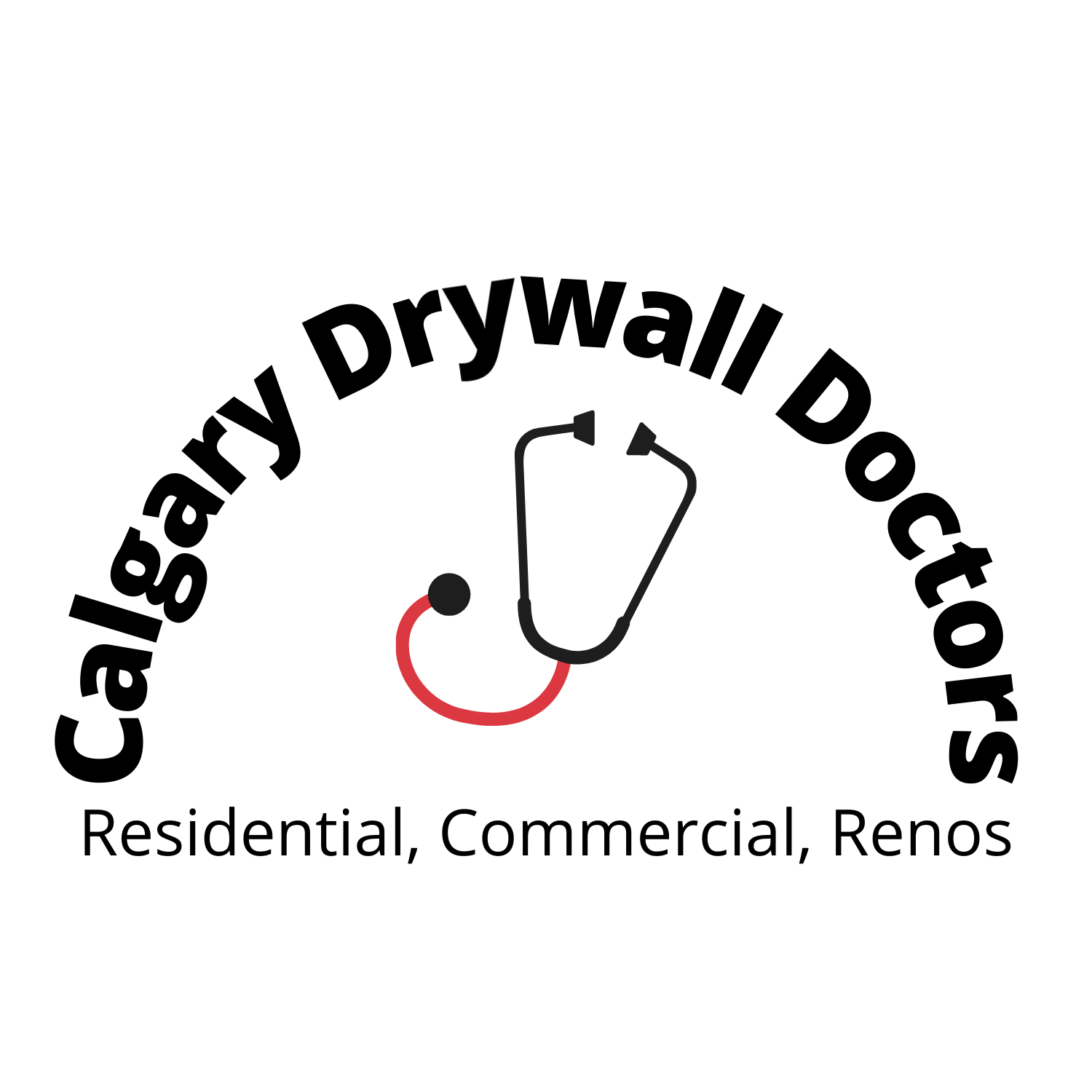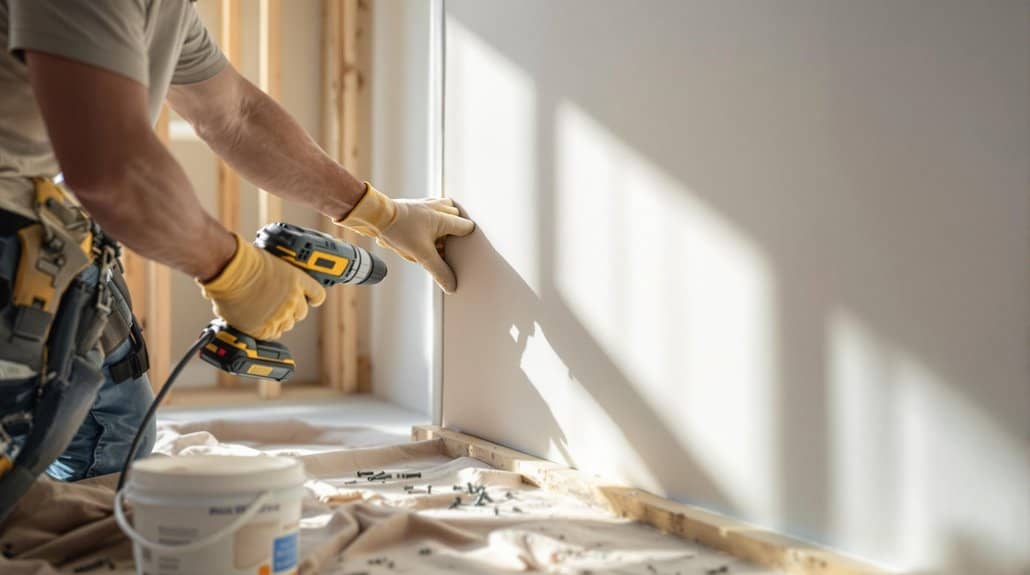Drywall installation in Calgary requires careful consideration of material types, from standard gypsum board ($10-20/sheet) to specialized moisture-resistant options ($60/sheet) for bathrooms and basements. You’ll need crucial tools like a utility knife, T-square, and drywall lift, along with proper safety gear. While DIY can save on labor costs ($1.50-3.50/sq ft), professional installation guarantees superior seam finishing and code compliance. Understanding your specific project requirements will help determine the most cost-effective and reliable approach.
Key Takeaways
- Calgary’s cold climate requires proper vapor barriers and moisture-resistant drywall installation to prevent condensation and mold growth.
- Local building codes mandate fire-resistant drywall in garages and specific spacing requirements for drywall fasteners at 12 inches apart.
- Professional installation costs in Calgary typically range from $1.50 to $3.50 per square foot, including labor and materials.
- Winter installations may offer better contractor availability and potential cost savings, but temperature control is essential during installation.
- Common mistakes include improper measurement and rushed joint compound application, which are amplified by Calgary’s fluctuating humidity levels.
Understanding Drywall Types and Selection
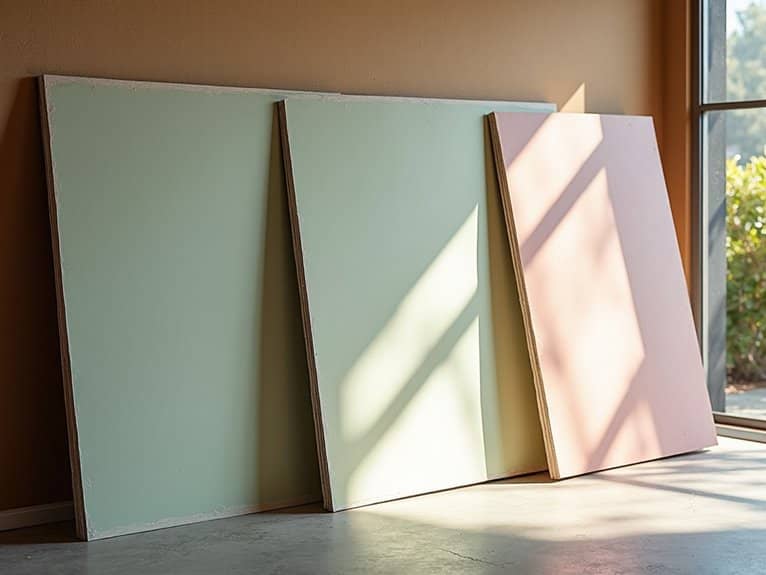
When starting on a drywall project in Calgary, you’ll need to carefully evaluate the specific requirements of each room to select the most appropriate drywall type. Standard drywall with its gypsum core remains the go-to choice for most interior spaces, but specific areas demand specialized solutions.
Your bathroom and kitchen installations will benefit from moisture-resistant drywall, while garage spaces require fire-resistant drywall to meet local building codes. For shared walls in multi-family dwellings, acoustic drywall provides vital soundproofing. The installation process varies depending on your chosen material, so understanding these drywall types is significant for project success. Consider specialty drywall options like cement board for shower surrounds or blueboard for custom finishes. Quality drywall selection guarantees durability and compliance while meeting your space’s unique demands. For basement installations, purple drywall options deliver superior protection against moisture and mold growth in Calgary’s variable climate.
Essential Tools and Materials Checklist
Now that you’ve identified the right drywall type for your Calgary project, assembling the proper tools and materials will set you up for professional-quality installation. Every successful drywall installation begins with having the right equipment readily available, ensuring you’re prepared for each phase of the project. For larger spaces costing around basic installation costs $500-$1500, having proper tools becomes even more critical.
- Crucial cutting tools: utility knife for primary cuts, drywall saw for detail work, and T-square for precise measurements
- Installation equipment: drywall lift for ceiling work, drywall screws, and proper mounting hardware
- Finishing materials: joint compound, drywall tape, 4-inch and 12-inch drywall knives for smooth seams
- Safety gear: safety goggles and dust masks to protect against airborne particles
Keep these items organized and within reach throughout your installation process to maintain efficiency and professional-grade results.
Professional vs. DIY Installation Considerations
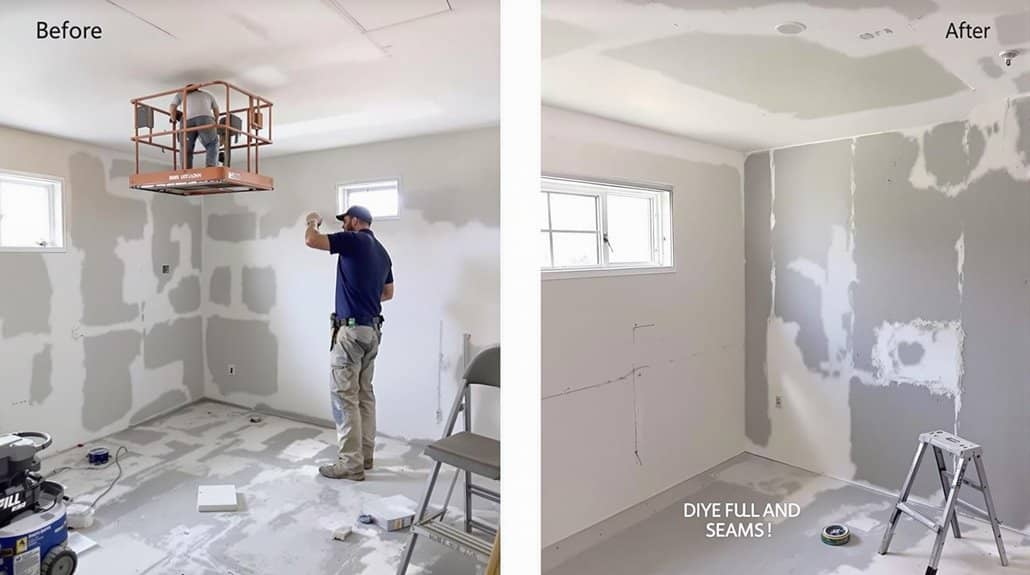
Deciding between professional and DIY drywall installation requires careful evaluation of your project’s scope, skill level, and available resources. While you’ll save on labor costs with DIY projects, professional drywall installation typically ranges from $1.50 to $3.50 per square foot in Calgary, offering expertise and efficiency that can prevent costly mistakes.
Consider that specialized types of drywall, including moisture-resistant panels, often demand professional handling to maintain structural integrity and guarantee compliance with local building codes. While you might feel confident tackling small drywall repair services, larger installations can challenge even experienced DIYers. Professional contractors deliver superior aesthetic appeal through precise seam finishing and proper panel alignment. They’re particularly valuable when working with fire-rated materials or completing complex installations where building code compliance is essential. Off-season installations between late fall and early spring can provide homeowners with discounted rates and increased contractor availability.
Cost Breakdown and Budget Planning
Every successful drywall project starts with a detailed cost analysis and budget framework. When planning your Calgary drywall installation, you’ll need to account for both material choice and labour charges. The average cost ranges from $1.50 to $3.50 per square foot, varying with project complexity.
Consider these crucial budget components:
- Material costs: Standard panels ($10-$20 per sheet) or specialized options ($60 per sheet)
- Labour charges: $1.50-$3.00 per square foot for hanging and finishing
- Contingency fund: 10-15% of total project cost for unexpected issues
- Contractor services: Multiple quotes needed for price comparison
Don’t forget that complex layouts, moisture-resistant materials, or fire-rated requirements will impact your final costs. Remember, investing in quality materials and experienced contractors often proves more cost-effective in the long run. Professional drywall contractors typically charge between $30 to $70 per hour for installation and finishing work.
Proper Installation Techniques and Best Practices
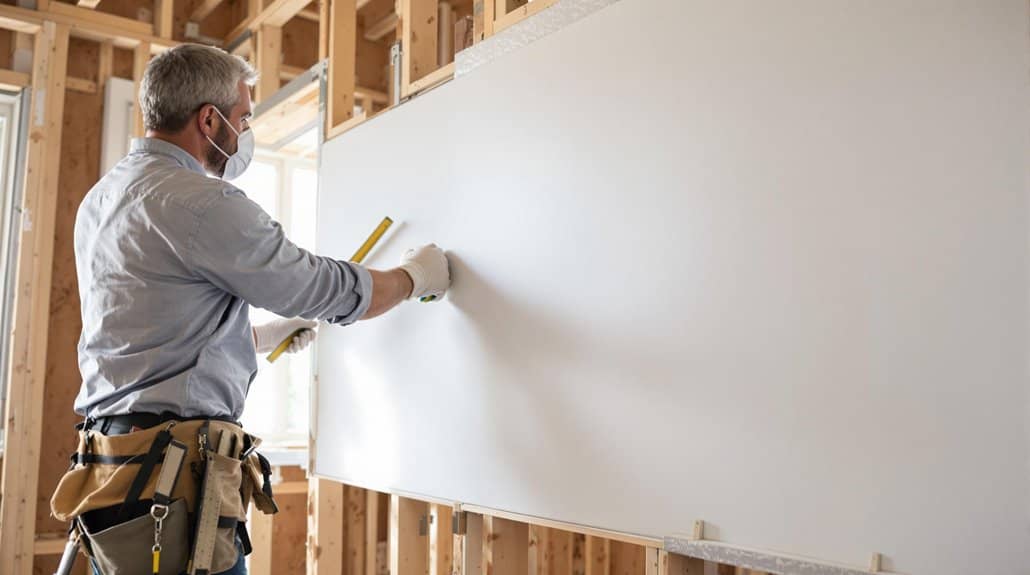
Professional drywall installation demands meticulous attention to key technical principles that guarantee structural integrity and aesthetic appeal. As Calgary homeowners, you’ll need to start by calculating the precise quantity of drywall required for your project, optimizing material costs while minimizing waste. When securing panels, space your screws 12 inches apart at edges and 16 inches in the field, ensuring they’re properly countersunk without breaking the paper facing.
For a seamless finish, you’ll want to apply drywall tape over all seams, followed by carefully feathered joint compound. If noise reduction is a priority, consider implementing double-layer installation with sound-dampening materials. Our soundproof drywall options provide effective sound reduction between rooms, making them perfect for families with children. Remember, proper installation techniques must align with local building codes specific to Calgary, ensuring your project meets all regulatory requirements while delivering professional-grade results.
Common Mistakes to Avoid During Installation
While drywall installation may seem straightforward, several critical errors can compromise both structural integrity and aesthetic outcomes. As Calgary homeowners, you’ll want to avoid these common mistakes that can lead to costly repairs and diminished results.
- Poor measuring and layout planning: Inaccurate measurements waste materials and inflate your budget unnecessarily
- Incorrect fastener spacing: Verify screws are placed 12 inches apart on edges and 16 inches in the field for peak stability
- Bottom gap omission: Always leave space between drywall and floor to prevent moisture damage from ground-level wicking
- Rushed joint compound application: Don’t skip proper drying time between coats, as this compromises adhesion and creates visible seams
Using mold-resistant drywall in basements helps prevent long-term moisture and mildew issues that commonly plague below-grade installations.
Maximizing the Lifespan of Your Drywall Investment
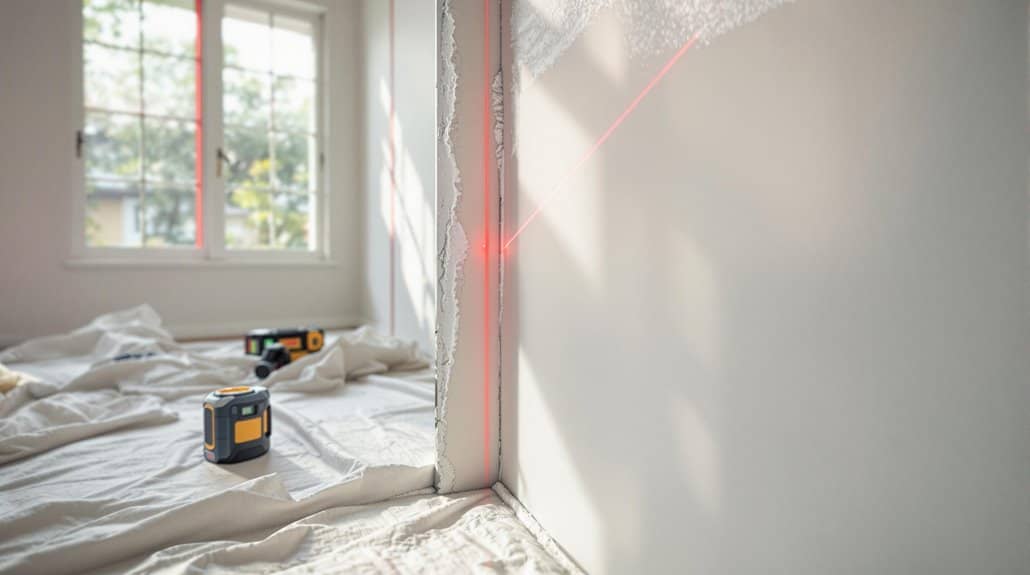
To protect your significant drywall investment, implementing an extensive maintenance strategy can extend its functional lifespan by decades. As Calgary homeowners, you’ll need to conduct regular inspections for cracks, water damage, and bulges that could compromise your installation’s integrity.
Maintain indoor humidity levels between 30-50% by utilizing proper ventilation systems, particularly essential given Calgary’s variable climate. For moisture-prone areas like bathrooms and kitchens, verify you’ve installed moisture-resistant drywall options. Don’t overlook the importance of a high-quality primer and paint application – these form your primary line of defense against daily wear. Working with skilled repair specialists can help identify preventative measures to avoid recurring damage and extend your drywall’s longevity.
Frequently Asked Questions
What Needs to Be Installed Before Drywall?
You’ll need proper framing, complete electrical wiring, secured plumbing, installed insulation, vapor barriers for moisture control, and soundproofing materials in place. Don’t forget fire-rated materials where required by code.
How Much Does It Cost to Install Drywall in Alberta?
You’ll find drywall installation in Alberta typically costs $1.50-$3.50 per square foot. Your total project estimate will depend on material choices, labor costs, finishing options, and whether it’s residential or commercial installation.
How Do You Plan Drywall Installation?
You’ll need to gather drywall tools, plan room preparation, consider moisture resistance and soundproofing options. Assess ceiling installation requirements, set project timeline, and review safety precautions before starting your drywall installation project.
How Do I Know What Drywall I Need?
You’ll need to match drywall types to your space’s requirements: standard for general walls, moisture-resistant for bathrooms, fire-rated for specific codes, and consider thickness options (1/4″ to 5/8″) based on soundproofing and durability needs.
Conclusion
Proper drywall installation isn’t just about hanging panels—it’s about creating a durable, code-compliant wall system that’ll withstand Calgary’s unique climate conditions. You’ll need to maintain ideal humidity levels (30-50%) and guarantee proper vapor barrier installation to prevent moisture-related failures. When you’ve completed your installation, schedule periodic inspections to identify potential stress cracks, fastener pops, or tape separation that could compromise your drywall’s structural integrity.
